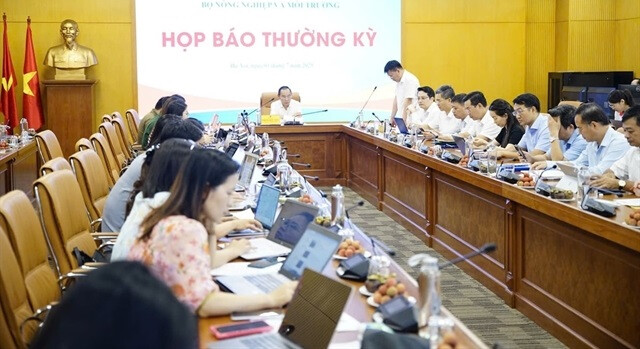
Vietnam's Ministry of Agriculture and Rural Development (MARD), in collaboration with the Ministry of Finance, has announced plans to rationally revise land valuation methods and comprehensively review land-related fee regulations. This initiative aims to address social imbalances caused by surging land prices and establish a market-based land pricing policy that equitably reflects the interests of both the state and its citizens.
Rising Land Prices and Intensified Conflicts of Interest
At a briefing held on Thursday (July 3) for the MARD's first-half performance review and second-half tasks, Mai Văn Phấn, Deputy Director General of the General Department of Land Administration, pointed out that rising land prices are a major obstacle to land-use conversion. He explained that there are currently two groups with conflicting interests regarding land use fees: first, those whose land is being acquired, who demand fair compensation; and second, those seeking to change land use, who face high tax burdens. Phấn emphasized that harmonizing the interests of these two groups and ensuring fairness is a key challenge.
Prior to the implementation of the 2024 Land Law, land prices were based on a state-issued price framework, which local governments used to establish their own price tables. However, this method often resulted in significant discrepancies with actual market prices, leading to insufficient compensation in public investment projects and delays in land acquisition, creating numerous impediments.
Transition to Market-Based Land Pricing Policy
Resolution No. 18, issued by the Party Central Committee on June 16, 2022, provides a clear directive that land prices should closely reflect market values. This aims to ensure that land owners receive fair compensation when their land is acquired and that those converting land use fulfill appropriate financial obligations.
With growing public concern over high land use fees imposed during land-use conversion in several provinces, particularly Nghệ An, Phấn emphasized that current practices must comply with existing legal regulations, including Government Decree 103. However, the MARD stated it is working with the Ministry of Finance to explore more rational valuation methods. This could include adjusting collection rates based on land type and user group. For example, discussions are underway to apply a lower rate for converting land for residential purposes, instead of the current 100% charge.
Phấn stressed, "The ultimate goal is to design a fair, market-based, and financially sustainable land pricing policy." He confirmed that all local governments must complete and issue updated land price tables by December 31 at the latest, for official implementation starting January 1, 2026.
Responding to Environmental Management and Trade Issues
Beyond land issues, various other current affairs were discussed at the briefing. Regarding concerns that administrative boundary consolidation could delay response times if environmental accident management is transferred to commune-level authorities, the MARD emphasized that it would provide training and clear guidelines to ensure local staff are adequately equipped.
Regarding the potential imposition of countervailing duties by the United States on Vietnamese goods starting July 9, the MARD stated it is collaborating with the Ministry of Industry and Trade to assess the impact on key export sectors like timber and seafood. Some petroleum products could face duties of 20-40%, and relevant agencies are reviewing market structures to formulate appropriate countermeasures.
Strengthening Food Safety and Combating Counterfeits
Concerning the controversy involving CP Vietnam (CP Livestock JSC), Phạm Kim Đăng, Deputy Director General of the Department of Livestock Production and Veterinary Medicine, stated that the Hậu Giang Province Department of Agriculture and Rural Development (now integrated with the Cần Thơ City Department of Agriculture and Rural Development) had disciplined and reassigned officials responsible for improperly stamping pig carcasses operating under contract with CP Vietnam at the Dững Nga slaughterhouse in Long Thạnh Commune, Phụng Hiệp District.
Đăng added that the MARD would intensify veterinary inspections and strengthen control over the distribution of diseased pigs, particularly in high-risk areas like Hanoi. Cần Thơ City police announced that despite images of low-quality meat circulating on social media, the company had not violated food safety regulations.
On May 30, a Facebook user named 'Jonny Lieu' claimed to work at a local food store in Sóc Trăng Province (now Cần Thơ City) and posted images of low-quality pork and chicken, along with claims about product quality related to CP Vietnam. The post quickly went viral, garnering over 171,000 reactions and more than 156,000 shares.
Regarding the increasing issue of counterfeit and unverified food products in some areas, the MARD's Quality Management Department pledged to enhance inspections and trace product origins through close collaboration with market surveillance agencies. For violations related to discarded goods (products discounted or deemed substandard and dumped into the environment), the Vietnam Environment Administration will clarify accountability and strengthen monitoring of distribution and retail businesses.
[Copyright (c) Global Economic Times. All Rights Reserved.]




























